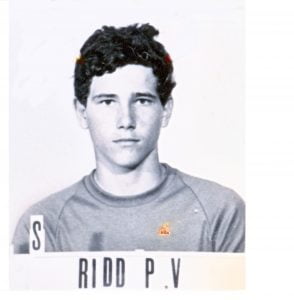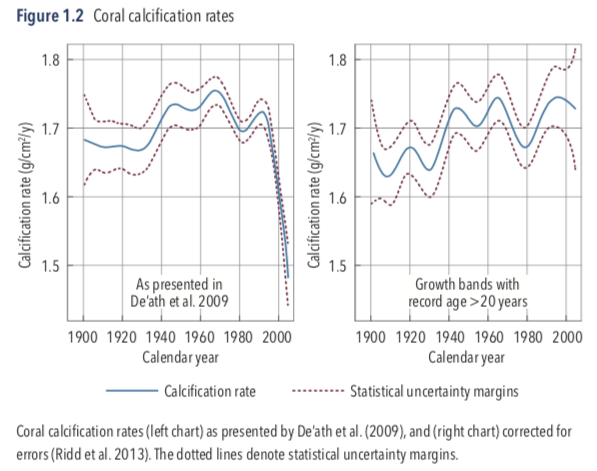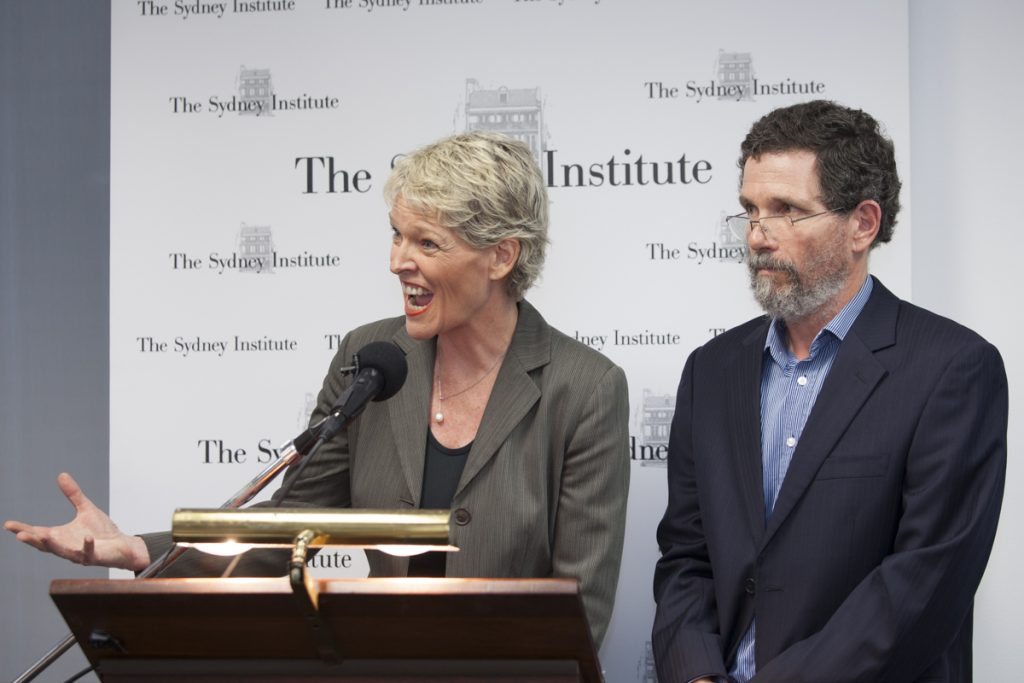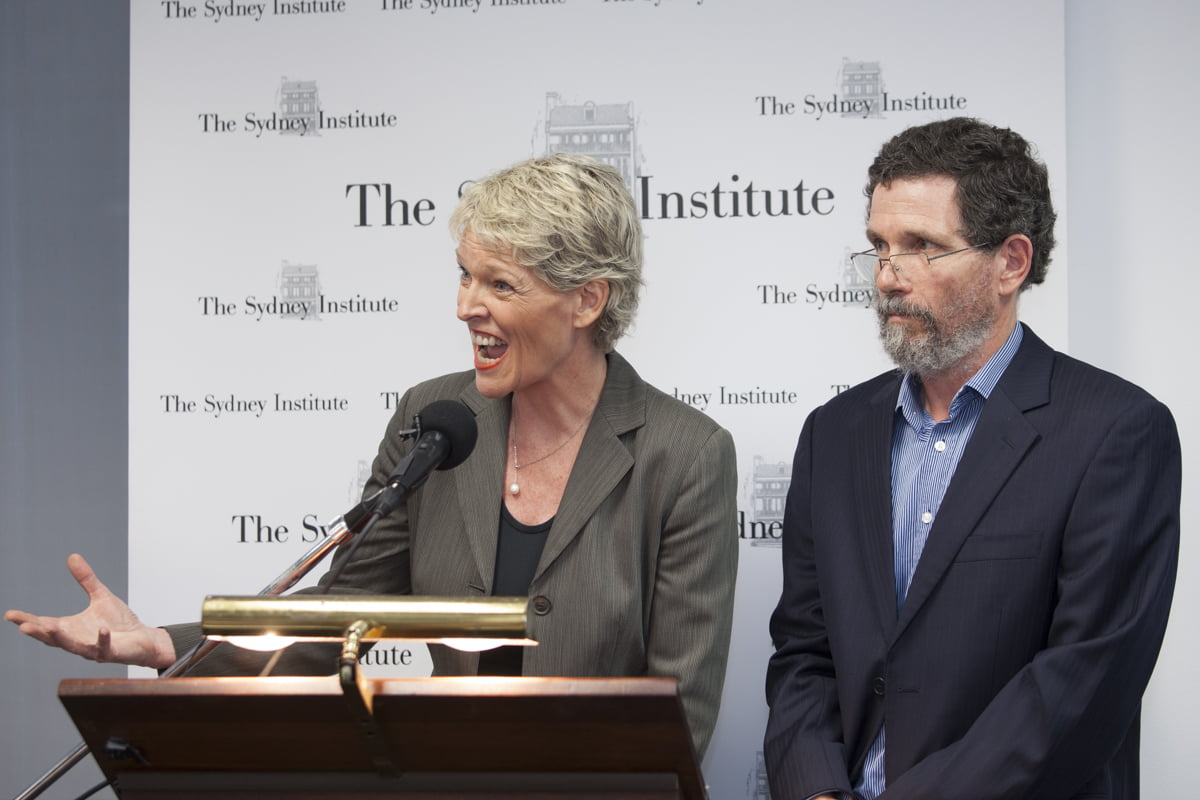BACK in 2016, when I asked Peter Ridd if he would write a chapter for the book I was editing I could not possibly have envisaged it could contribute to the end of his thirty-year career as a university professor.
Considering that Peter enrolled at James Cook University as an undergraduate back in 1978, he has been associated with that one university for forty years.
Since Peter was fired on 2 May 2018, the university has attempted to remove all trace of this association: scrubbing him completely from their website.
But facts don’t cease to exist because they are removed from a website. The university has never challenged the veracity of Peter’s legitimate claims about the quality of much of the reef science: science on which billions of dollars of taxpayer-funded research is being squandered. These issues are not going away.
Just yesterday (Friday 18 May), Peter lodged papers in the Federal Court. He is going to fight for his job back!
If you care about the truth, science and academic freedom, please donate to help bring this important case to court.
It doesn’t matter how little or how much you donate. Just make sure you are a part of this important effort by donating to Peter’s GoFundMe campaign.
Peter deliberately choose to frame the book chapter about the replication crisis that is sweeping through science.
In this chapter – The Extraordinary Resilience of Great Barrier Reef Coral and Problems with Policy Science – Peter details the major problems with quality assurance when it comes to claims of the imminent demise of the reef.
Policy science concerning the Great Barrier Reef is almost never checked. Over the next few years, Australian governments will spend more than a billion dollars on the Great Barrier Reef; the costs to industry could far exceed this. Yet the keystone research papers have not been subject to proper scrutiny. Instead, there is a total reliance on the demonstrably inadequate peer-review process.
Ex-professor Peter Ridd has also published extensively in the scientific literature on the Great Barrier Reef, including issues with the methodology used to measure calcification rates. In the book he explains:
Like trees, which produce rings as they grow, corals set down a clearly identifiable layer of calcium carbonate skeleton each year, as they grow. The thicknesses and density of the layers can be used to infer calcification rates and are, effectively, a measure of the growth rate. Dr Glenn De’ath and colleagues from the Australian Institute of Marine Science used cores from more than 300 corals, some of which were hundreds of years old, to measure the changes in calcification during the last few hundred years. They claimed there was a precipitous decline in calcification since 1990, as shown in Figure 1.2.

However, I have two issues with their analysis. I published my concerns, and an alternative analysis, in the journal Marine Geology (Ridd et al. 2013). First, there were instrumental errors with the measurements of the coral layers. This was especially the case for the last layer at the surface of the coral, which was often measured as being much smaller than the reality. This forced an apparent drop in the average calcification for the corals that were collected in the early 2000s – falsely implying a recent calcification drop. Second, an ‘age effect’ was not acknowledged. When these two errors are accounted for, the drop in calcification rates disappear, as shown in Figure 1.2.
The problem with the ‘age effect’, mentioned above, arose because in the study De’ath and colleagues included data from corals sampled during two distinct periods and with a different focus; I will refer to these as two campaigns. The first campaign occurred mostly in the 1980s and focused on very large coral specimens, sometimes many metres across. The second campaign occurred in the early 2000s due to the increased interest in the effects of CO2. However, presumably due to cost cutting measures, instead of focusing on the original huge coral colonies, the second campaign measured smaller colonies, many just a few tens of centimetres in diameter.
In summary, the first campaign focused on large old corals, while, in contrast, the second campaign focused on small young corals. The two datasets were then spliced together, and wholly unjustifiable assumptions were implicitly made, but not stated – in particular that there is no age effect on coral growth…
Dr Juan D’Olivo Cordero from the University of Western Australia collected an entirely different dataset of coral cores from the Great Barrier Reef to determine calcification rates. This study determined that there has been a 10% increase in calcification rates since the 1940s for offshore and mid-shelf reefs, which is the location of about 99% of all the coral on the Great Barrier Reef. However, these researchers also measured a 5% decline in calcification rates of inshore corals – the approximately 1% of corals that live very close to the coast. Overall, there was an increase for most of the Great Barrier Reef, and a decrease for a small fraction of the Great Barrier Reef.
While it would seem reasonable to conclude that the results of the study by D’Olivo et al. would be reported as good news for the Great Barrier Reef, their article in the journal Coral Reefs concluded:
Our new findings nevertheless continue to raise concerns, with the inner-shelf reefs continuing to show long-term declines in calcification consistent with increased disturbance from land-based effects. In contrast, the more ‘pristine’ mid- and outer-shelf reefs appear to be undergoing a transition from increasing to decreasing rates of calcification, possibly reflecting the effects of CO2-driven climate change.
Imaginatively, this shift from ‘increasing’ to ‘decreasing’ seems to be based on an insignificant fall in the calcification rate in some of the mid-shelf reefs in the last two years of the 65-year dataset.
Why did the authors concentrate on this when their data shows that the reef is growing about 10% faster than it did in the 1940s?
James Cook university could have used the chapter as an opportunity to start a much-needed discussion about policy, funding and the critical importance of the scientific method. Instead, Peter was first censored by the University – and now he has been fired.
When I first blogged on this back in February, Peter needed to raise A$95,000 to fight the censure.
This was achieved through an extraordinary effort, backed by Anthony Watts, Joanne Nova, John Roskam and so many others.
To be clear, the university is not questioning the veracity of what ex-professor Ridd has written, but rather his right to say this publicly. In particular, the university is claiming that he has not been collegial and continues to speak-out even after he was told to desist.
New allegations have been built on the original misconduct charges that I detailed back in February. The core issue continues to be Peter’s right to keep talking – including so that he can defend himself.
In particular, the university objects to the original GoFundMe campaign (that Peter has just reopened) because it breaches claimed confidentiality provisions in Peter’s employment agreement. The university claims that Peter Ridd was not allowed to talk about their action against him. Peter disputes this.
Of course, if Peter had gone along with all of this, he would have been unable to raise funds to get legal advice – to defend himself! All of the documentation is now being made public – all of this information, and more can be found at Peter’s new website.
Together, let’s fight this!
Go fund ex-professor Ridd at:
https://au.gofundme.com/peter-ridd-legal-action-fund.
The Institute of Public Affairs published Climate Change, The Facts 2017, and continues to support Peter’s right to speak the truth. For media and comment contact Evan Mulholland on 0405 140 780, or at emulholland@ipa.org.au.
Buy the book if you haven’t already: this is another way of showing your support.

The most important thing is to not be silenced, shout about this! I received an email last week: “Bought Climate Change, The Facts 2017, as requested, to support Peter Ridd. I’m not making any friends at dinner parties at the moment. Stuff ’em.”


 Jennifer Marohasy BSc PhD is a critical thinker with expertise in the scientific method.
Jennifer Marohasy BSc PhD is a critical thinker with expertise in the scientific method.

So, much thanks to Anthony Watts for his support:
https://wattsupwiththat.com/2018/05/18/climate-skeptic-professor-peter-ridd-fired-for-his-views-by-james-cook-university-jcu/ !
I support Peter in this. Have been considering doing a pHd at Cairns but concerned due to Peter’s treatment. This is a distinct breach of s29 and 30 of the human rights UN treaty.
We need someone like Peter Ridd in parliament. When he wins his case he should run.
Great support from Anthony Watts. I have donated for Peter’s defence,(not a lot, -age pensioner). I would love to see Peter in parliament but I am afraid he would receive the same cold shoulder Dr Dennis Jensen got while he was there. They disendorsed him first chance they got. Our country needs people like you and Jo Nova.
Ridd continues to on the page “Physical Resources Staff” of JCU.
See: .
And on numerous other pages.
I really do not know who’s right and who’s wrong in this particular storm in a teacup. What has been clear for quite some time is the wrongness of huge universities, almost all of which (in Oz at least) fail to qualify for the label “university”, if only for reason of their bibliophobia.
End public funding. Now !
Thanks, Jen, for your support for PR. Happy to help and best of luck against this pathetic groupthink bunch.
The Kafkaesque state of institutions corrupted by climate extremism should concern everyone.
If the climate consensus is so robust the consensus should not have to be enforced with such blatant bullying and suppression.
I wrote to the Editor of the Brisbane Sunday Mail newspaper in May last year after they published an article “Why the Reef will never be the same again”. It did not even mention the extreme El Nino of 2015/16 and totally blamed human CO2 warming for the mass bleaching on the northern reefs.
I pointed out that false news like this was being disseminated by the euphemistically named “ARC Centre of Excellence for Coral Reef Studies” at James Cook University and used Professor Ridd’s information on historic sea level fall which caused “the hundreds of square kilometres of dead reef-flats which are plain to see today”.
Since then I have noticed that they have toned down their disaster rhetoric and have published articles on the wonders of coral spawning and bleached corals regenerating so maybe my letter had some effect.
We need scientists like Peter Ridd to “keep the bastards honest” and provide real science instead of “grant seeking propaganda” and though I missed last time I will definitely be donating this time.
Makes perfect sense that he is fired, he is like a wasp threatening to disturb the picnic….
“Australian governments will spend more than a billion dollars on the Great Barrier Reef; the costs to industry could far exceed this.”
That money doesn’t get put on the reef it ends up in people’s pockets..
Admire and support Peter Ridd’s advocacy for more rigor in reef science and the need for quality assurance. A
Sadly it appears JCU is prosecutor, judge, jury and executioner.
I would like to advise the chief scientist Dr Alan Finkel over this matter but already have a different big matter in with him. Might anyone here be interested in doing so? His email address is in the public domain: alan.finkel@chiefscientist.gov.au
As more background, (being careful what to say) I suspect that James Cook University is very anxious to protect the reputation of who is described in their 2017 report as “Distinguished Professor Terry Hughes”. He is Director of the modestly named ‘ARC Centre of Excellence for Coral Reef Studies’.
The ARC (Australian Research Council) provides generous funding for that centre, which heads a list of 31 centres or facilities in that report. On the other hand, Prof ‘Ridd’s ‘Marine Geophysics Laboratory’ has no mention and has a diminutive website compared with that of Prof Hughes.
Prof Hughes made his agenda clear back in 2012 when he convened the 12th International Coral Reef Symposium in Cairns where he had a consensus originating in the USA endorsed by over 2,000 even before the 5-day event opened.
Hughes was well pleased in his closing address and party here: http://www.icrs2012.com/Default.htm
Have your vomit bag handy
Another money spinner was with various field trips at over $2,000 per person extending up to three weeks that must have been nice, and presumably funded from the 80 countries involved. http://www.icrs2012.com/FieldTrips.htm
What did the his union say when Prof. Riggs complained to them about his wrongful dismissal, and asked for assistance. He did approach them, didn’t he? Cheaper than lawyers.
I did an interview on Cairns radio just now. A big thanks to John McKenzie 4CA for getting behind this campaign. Also, there is something today in the Cairns Post: http://www.cairnspost.com.au/news/cairns/jcu-rebukes-disrespectful-marine-science-professor-peter-ridd-over-sacking/news-story/4b7f334d027f296ce827b3fb6aab64ca?csp=018aad70fe31b7f11838c3b35b36f82a
Cairns Post have already deleted the article. Perhaps legal threats from JCU?
Ross C. My understanding is that he involved his Union rep. in the first round of negotiations, and that the Union rep. suggested he had little chance of keeping his job – especially if he didn’t do as the University said and shut-the-hell up.
Just heard that Peter Ridd has achieved his target.
So you all did a wonderful job.
Especially Jen.
I should’ve said “financial” target.
The rest and the best is yet to come.
Yes,I don’t agree that the university can try and use the code of conduct to stifle anyone’s right to make comments about the science. In their statement they say Peter (publicly) ‘criticize(s) and denigrate(s) the work of other scientists’; well just about any staff employee who makes any public statement about science or any other scientist’s work could potentially then be charged with such a thing-it’s ludicrous. So you can’t have any scientist on, for example, the ABC disagreeing with each other, because they would ‘criticize and denigrate’ each other.
Tell the university admin they need to go back to kindergarten.
So he CHOSE to break his employment contract and continued to publicly attack his employer.
He then CHOSE to take the University to court, demanding his reinstatement.
The IPA and other agenda driven organisations are helping fund this vanity project.
Is the mining company that funded his ‘research’ putting any money in?
They can certainly offord it. Perhaps they don’t want that link to be too well known? Or perhaps the poor Prof. Ridd wants it kept quiet?
This bloke is persisted in attacking his employer and breaking his employment contract.
JCU have done NOTHING wrong.
“JCU have done NOTHING wrong.”
I wonder why they didn’t want him to mention it even to his wife?
Was that in his employment contract too?
Jen, I have great regard for Prof Peter Ridd and for yourself, and I believe JCU have sacked him to protect their “business” of alarmist AGW and the Great Barrier Reef, and the ARC funding gravy train that follows close behind. In short, they decided there was no place for independent thought on their ship.
But your headline says Prof Peter Ridd was “sacked for telling the truth”, and as you explain, this means his research stance on GBR issues such as bleaching, and his academic calling out of problems such as “quality assurance” which means research reproducability and rigour.
But the problem is JCU are saying just the opposite: they have sacked Prof Ridd for disciplinary and Code of Conduct reasons, and they state specifically they do not disagree with his published scientific positions, nor his comments on quality assurance issues.
Now I dont think these reasons given by JCU are true, they are just the rules they found convenient to sack him. But Prof Ridd has got to argue he was sacked for political reasons, and the actual rules they used, and are now claiming as the reason, are trumped up.
Its not the same as being “sacked for telling the truth”.
ps I donated to his legal fund.
Prof. Ridd has refused to accept findings that differ with his. That’s okay.
He has gone on record in several media outlets, making wild accusations about the motivation of his fellow academics and the University itself. Not scientific, but personal. That’s not okay.
He ignored his own unions advice and has refused to abide by JCUs employment contract and has left JCU with no alternative but to terminate his contract.
He has now chosen to take JCU to court demanding they reinstate him (good luck) using other people’s money.
The only funny part, was Prof Ridd complaining about JCU having the temerity to defend themselves in the court case that he instigated!!
Hubris has got the better of this bloke in a big way. Martyrdom awaits.
Broaden your mind a little and learn, Ross C:
https://www.theaustralian.com.au/higher-education/opinion/dont-you-dare-upset-the-moneymaking-engine/news-story/eace23b2ee56317eda332250a4f1570d?link=TD_www.theaustralian_article.fd6268e6f34e13e3&utm_source=www.theaustralian_article.fd6268e6f34e13e3&utm_campaign=circular&utm_medium=THEAUSTRALIAN
Riss C,
Polly want a cracker?
the truth always hurts ,many good men are silenced by hipricy,but we must fight with all our power , bob carter a man of wisdom for his good judgement ,and truth and will always be reminded for it. never stop fighting for the truth and we will win.
I have been travelling to Queensland multiple times over the last five years, and if you do not think the reef is in trouble you are dreaming. What it once was, and what it is now is very sad.
I despair that thoughtful, enlightened politics left the room with US President Eisenhower’s farewell…to be replaced by omnipresent marketing technicians.
“The prospect of domination of the nation’s scholars by Federal employment, project allocations, and the power of money is ever present and is gravely to be regarded. Yet, in holding scientific research and discovery in respect, as we should, we must also be alert to the equal and opposite danger that public policy could itself become the captive of a scientific technological elite.
In this revolution, research has become central; it also becomes more formalized, complex, and costly. A steadily increasing share is conducted for, by, or at the direction of, the Federal government.
Today, the solitary inventor, tinkering in his shop, has been overshadowed by task forces of scientists in laboratories and testing fields. In the same fashion, the free university, historically the fountainhead of free ideas and scientific discovery, has experienced a revolution in the conduct of research. Partly because of the huge costs involved, a government contract becomes virtually a substitute for intellectual curiosity. For every old blackboard there are now hundreds of new electronic computers.”
The never quoted section of Eisenhower’s 1961 “Military Industrial Complex” speech.
http://avalon.law.yale.edu/20th_century/eisenhower001.asp
Gosh speaking out against the status quo is obviously dangerous in this country. Where are we heading? Reminds me of Russia.
University management cannot instruct a professor how to interpret the science in their field of expertise. How can they? University management, by definition, lack the competence to form a qualified opinion in that field. They have employed a professor for that.
The professor of a university, is employed to research and publish. And publish he did.
I’d reckon it must run against the terms of his employment contract. To restrict a professor from publishing because the facts of his research proved inconvenient.
A university is not a company. And anyway, a company must always act honestly. And what can be more honest that speaking the truth from the science.
We don’t expect company’s to lie and behave dishonestly, and nor can University management silence their leading expects into a silent lie, in the field of their research and expertise.
James Cook should exit this field of study. Close the department. But while it remains, it cannot expect to mute the researchers, restrict their trade, and change the truth away from the way their experts have witnessed and reported the facts. No more than a judge can instruct a witness on what they saw.